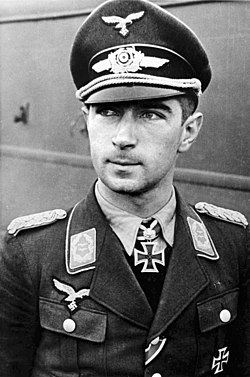Werner Mölders
| Werner Mölders | |
|---|---|

Werner Mölders
|
|
| Nickname(s) | Vati ("Pappy" or "Daddy") |
| Born |
18 March 1913 Gelsenkirchen, Westphalia |
| Died | 22 November 1941 (aged 28) Breslau |
| Buried at | Invalidenfriedhof Berlin |
| Allegiance |
|
| Service/branch |
|
| Years of service | 1935–41 |
| Rank | Oberst (Colonel) |
| Unit | Condor Legion, JG 53, JG 51 |
| Commands held | III./JG 53, JG 51 |
| Battles/wars |
|
| Awards |
Spanish Cross in Gold with Swords and Diamonds Knight's Cross of the Iron Cross with Oak Leaves, Swords and Diamonds |
| Signature |  |
Werner Mölders (18 March 1913 – 22 November 1941) was a World War II German Luftwaffe pilot and the leading German fighter ace in the Spanish Civil War. Mölders became the first pilot in aviation history to claim 100 aerial victories—that is, 100 aerial combat encounters resulting in the destruction of the enemy aircraft, and was highly decorated for his achievements. He was instrumental in the development of new fighter tactics that led to the finger-four formation. He died in an air crash in which he was a passenger.
Mölders joined the Luftwaffe in 1934 at the age of 21. In 1938, he volunteered for service in the Condor Legion, which supported General Francisco Franco's Nationalist side in the Spanish Civil War, and shot down 14 aircraft. In World War II, he lost two wingmen in the Battle of France and the Battle of Britain, but shot down 53 enemy aircraft. With his tally standing at 68 victories, Mölders and his unit, the Jagdgeschwader 51 (JG 51), were transferred to the Eastern Front in June 1941 for the opening of Operation Barbarossa. By the end of 22 June 1941, the first day of Barbarossa, he had added another four victories to his tally and a week later, Mölders surpassed Manfred von Richthofen's 1918 record of 80 victories. By mid-July, he had 100 World War II victories.
Prevented from flying further combat missions for propaganda reasons, at the age of 28 Mölders was promoted to Oberst, and appointed Inspector General of Fighters. He was inspecting the Luftwaffe units in the Crimea when he was ordered to Berlin to attend the state funeral of Ernst Udet, the World War I flying ace. On the flight to Berlin, the Heinkel He 111 in which he was traveling as a passenger encountered a heavy thunderstorm during which one of the aircraft's engines failed. While attempting to land, the Heinkel crashed at Breslau, killing Mölders and two others.
...
Wikipedia
